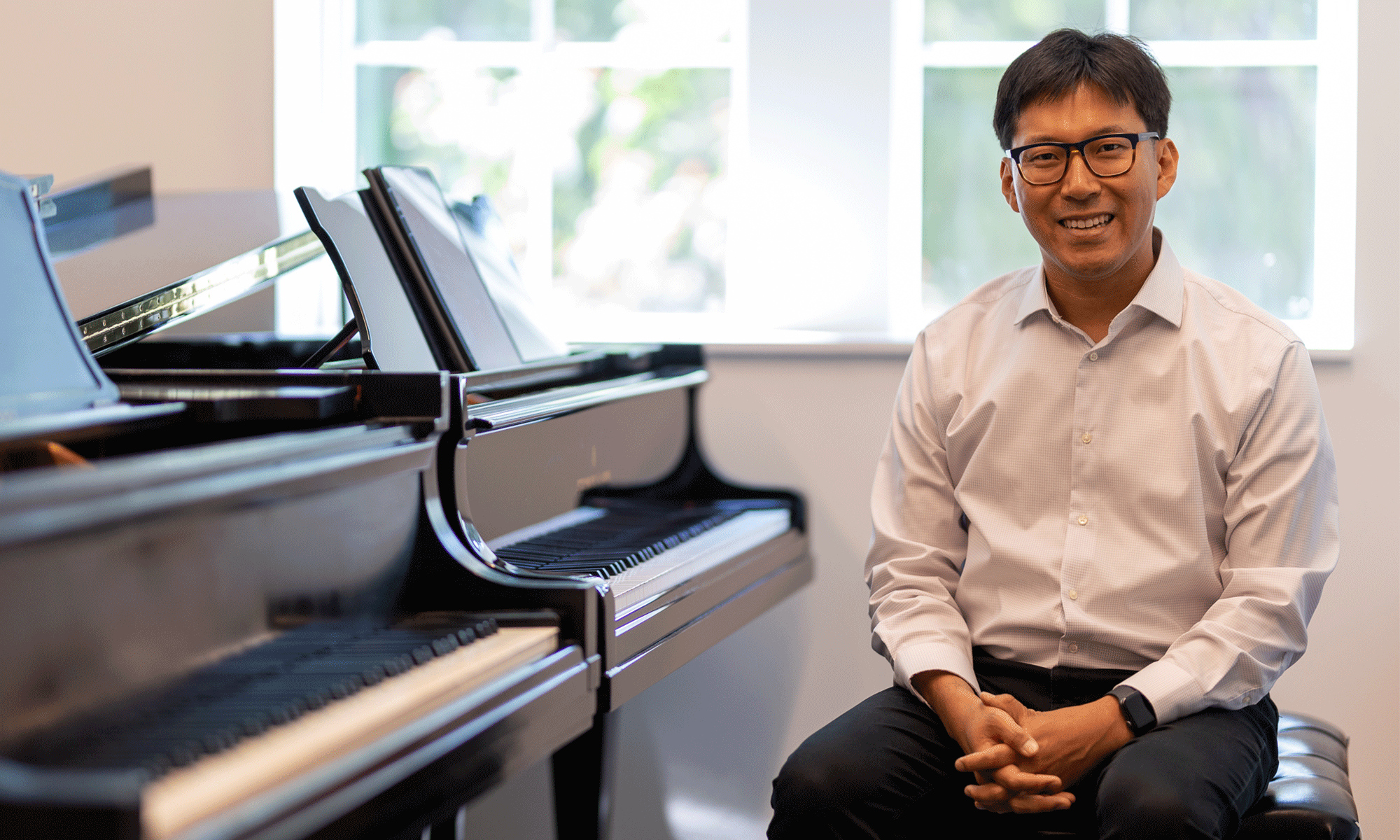The piano looms large in the professional and personal life of assistant professor Sun Min Kim, a fact evidenced by a visit to his office, where two grand pianos take up half the available space.
Kim began playing the piano as a boy in South Korea at the encouragement of his mother, who as a Catholic liked the idea of a son who played the church organ. But with Kim too small to work the organ pedals, the instructor suggested that he start on piano instead.
“The rest is history,” Kim says. “I stuck with it, and this has been my life, my passion, and my love.”
Those early lessons marked his first steps along a path that led him to study at one of the most elite music conservatories in the United States, the Eastman School of Music in Rochester, New York; to perform at prestigious concert venues including the storied Carnegie Hall; and to teach at Denison in 2018.
“Music has taken me many places,” Kim says. “It has been the gateway to the world for me.”
Do you have a favorite composer or piece of music?
It’s an ever-evolving, ever-changing thing. If the music really talks to my heart, I immediately fall in love with the composer right away.
Right now, I probably enjoy practicing the most when I perform music by Franz Liszt and Florence Price. Liszt was a 19th century composer from Hungary who really elevated the piano as a solo instrument with his innovative use of piano technique. Price was a composer in the turn of the 20th century, and she was the first Black American composer whose work was premiered by the Chicago Symphony Orchestra. The way she wrote music for piano was innovative and showcased her mastery of the instrument. She really understood what the instrument was capable of.
Price synthesized a lot of American folk songs and Black spirituals with the Western art music idioms. Her music is quintessentially American.
Sun Min Kim, an assistant professor of music, says his piano students bring intelligence and creativity to the instrument that he finds inspiring.
You have a portrait prominently displayed in your office. Who is it?
She is my teacher from Eastman. Her name is Nelita True. She was a giant, and she’s somebody I try to emulate every day when I come here to teach. She was such a dedicated teacher and pianist. She taught me not only how to play piano, but every aspect of life, like professionalism, the importance of going above and beyond, and always striving for perfection, even though that’s not a goal that can be achieved by anybody. (laughs) It can be a little scary when I mess up or am not playing well; I feel like she’s watching and is going to say something.
At the same time, because she was such a refined pedagogue, I often imagine what she would have done or said when I search for ways to improve my students’ playing. As she was a person who fueled my eternal love for music, looking at her portrait is an everyday reminder of why I love what I do.
What do you like about teaching music at Denison, and how does the study of music at a liberal arts college differ from a conservatory like the one you attended?
If I had taught at a conservatory, I would get a very specific kind of piano student. In the conservatory setting, technical mastery is the No. 1 priority. In pursuit of technical perfection, or as close to it as possible, their musical interpretation could sometimes be sterile, not very imaginative.
At Denison, the piano students I work with are very smart, and every one of them is creative in their unique way because their interests are so diverse. They bring fresh ideas when they play and interpret music. Since they are not confined by this idea of having to play clean, they tend to take more risks, which spurs creativity.
Music students at Denison often find they are not confined by the idea of technical perfection, as they might be in a more traditional conservatory setting, assistant professor Sun Min Kim says.
It often inspires me when they bring to a piece of music their ideas or interpretations that I have never thought of, and it is truly exciting.
Earlier this year, you became a dad. How is it going?
Good. Things are always changing. Before it was just food and a clean diaper, and he was very happy. But now he has to feel entertained, either held or played with or something like that, and then whenever he doesn’t like what I’m doing at the moment, he cries. But he’s also beginning to smile now, which makes me love him even more.
Is it safe to assume he’s been introduced to the piano?
Yes. I’ll practice with him quite a bit. My mom was visiting recently, and she noticed that the baby gets calmer when I practice. I guess he must have heard me practicing since he was in my wife’s womb. I think he perceives it as a natural thing in his life.




